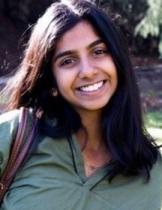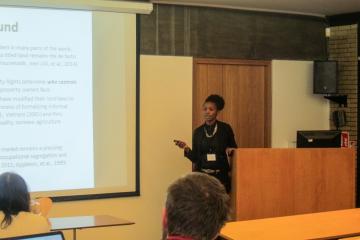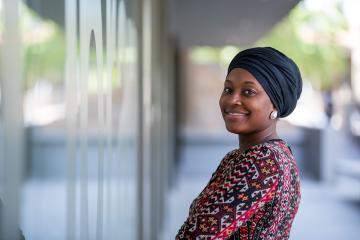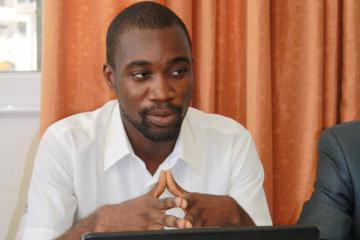
African Scholar Spotlight: Dr. Khadijat Busola Amolegbe
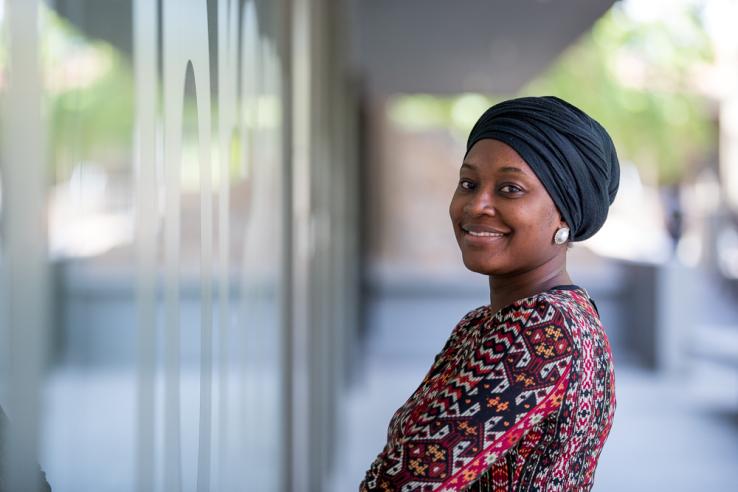
This post is part of our ongoing series showcasing the work and journey of economists from the African continent who are leading randomized evaluations.
In this post, we speak with Dr. Khadijat Busola Amolegbe, a lecturer in the Department of Agricultural Economics and Farm Management at the University of Ilorin, Nigeria. Khadijat’s primary research interests include food security, labor markets, agricultural development, and poverty alleviation.
What drew you to the field of development economics and, in particular, working with impact evaluations?
I studied agriculture for my undergraduate degree, which is where I was first exposed to its intersectionality with development economics. After my undergraduate studies, I interned at the Central Bank of Nigeria, where I worked in the agricultural credit services division on projects related to commercial agricultural credit schemes and risk management for agricultural lending.
My practical experience from these government-run agricultural projects motivated me to pursue a PhD in agricultural economics and conduct research in the field. I was subsequently introduced to impact evaluations through a rigorous analytical fellowship at the University of Cape Town—in partnership with the World Bank and the African Economic Research Consortium (AERC)—focused on land economics and governance.
What are your broad research interests?
My primary research interests relate to food security, agriculture, rural development, poverty, and inequality. This is in line with one of my current projects, studying the impact of a digital literacy intervention on rural farmer access to output markets. This is particularly relevant given the fast-growing digital divide between rural and urban communities in Nigeria, even as digital technologies or platforms continue to increase and transform the country’s economy overall.
Apart from this, increasingly many of my projects also focus on women’s empowerment as a cross-cutting theme in agricultural economics, especially as it relates to household decision-making power and ownership of assets. For instance, I am currently working on a project that is evaluating the gendered effects of rainfall shocks and crop diversification strategies on food security among rural farming households.
One of your current projects was recently funded by J-PAL’s Digital Identification and Finance Initiative. What research question are you trying to answer through this project?
I am working on a proposal development project related to the enrollment of rural farming households in digital identification payment systems in Nigeria. My focus at the moment is quite broad, as I am trying to understand some of the general constraints rural farming communities face in the adoption of these digital tools through farmer interviews and focus group discussions.
I have already gathered a lot of contextual knowledge through the proposal development process, and I am hoping to apply for a pilot grant to test interventions that can help governments or NGOs effectively target beneficiaries for their programs and facilitate an equitable distribution of services.
What do you see are the big unanswered research questions in Nigeria that randomized evaluations may be able to help answer, and how does this relate to any projects you are excited to work on in the future?
There is a large disconnect between what governments are trying to achieve through digital platforms, and the accessibility of these platforms at the grassroots level. This was especially evident through leakages in government payments to rural households during the Covid-19 pandemic.
Speaking to farmers in rural communities, it is understandable that many households do not see the value of engaging in digital interventions given that they often do not receive the payments or federal benefits that are promised. I am interested in working with digital providers and the government to test products catered to low-income communities (such as risk management tools or credit access), and study how to best prevent these types of leakages in payment systems or other services.
How can organizations like J-PAL continue to build on the support they provide to researchers based in Africa?
In addition to access to research funding from J-PAL, which continues to be one of the biggest barriers for African scholars, I have particularly benefited from the research resources, training opportunities, and mentorship components of the African Scholars program. My mentor from J-PAL has supported me beyond my DigiFi-funded project and continues to provide feedback on new research ideas, share relevant opportunities, and guide me to conduct stronger research in the field of economics.
Credibility from access to J-PAL’s network and funding has also assisted me in my career. African researchers often fight for credibility and my participation in the African Scholars program has not only strengthened my skills, but has also encouraged others to recognize my research in this field.
One of the challenges I continue to grapple with is facilitating connections with other African researchers. Organized conferences or networking events could be a great way to meet other development economists working in Africa and spark collaborations.
Another area where J-PAL could continue to expand its support is to extend resources and funding opportunities to graduate students working under local researchers. I have many students who are interested in learning more about randomized evaluations and I think that building a support system for this could be useful for other academics based at African institutions as well.
Do you have advice to offer other young aspiring African scholars thinking about a career in economic research?
The majority of the research done in Africa and about Africa is not done by African researchers. However, we need to recognize the unequal playing field we face in terms of access to facilities or human capital and learn to leverage our strengths and contextual knowledge to drive policy research forward.
Don’t be afraid to take advantage of the growing number of opportunities targeting local African researchers. Make the most of the free resources available online about conducting policy evaluations, attend online lectures, read papers, and reach out to other scholars, so that we can continue to grow together and be successful researchers in the field of development economics.
Dr. Khadijat Busola Amolegbe is a lecturer at the Department of Agricultural Economics and Farm Management at the University of Ilorin in Nigeria. Previously she was a visiting research fellow at Cornell University under the Structural Transformation of African Agriculture and Rural Spaces fellowship program. Khadijat holds a PhD and MSc in Agricultural Economics from the University of Ilorin. Her fields of specialization include food security, agricultural development, poverty, labor markets, and development economics. Dr. Amolegbe received funding from the Digital Identification and Finance Initiative (DigiFi) in 2020 for her project,“Rural Households' Enrolment in Digital Identification and Payment Systems.”
Over the course of 2022, J-PAL will publish a series of blog posts that highlight the research interests and ongoing evaluations of researchers who are working on issues related to poverty and economic growth. Each post will also showcase topics or unanswered questions researchers view as high-priority in their countries and regions, and highlight their advice for aspiring African researchers seeking a career in economics.
